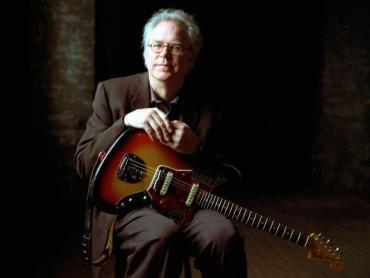
In 2016, innovative and adventurous guitarist Bill Frisell gave a world premiere performance at the Strand in San Francisco of new music written for the FreshGrass Commission, a composing gig given annually to an artist whose work reflects the FreshGrass mission to preserve and support innovative grassroots music. He put together an ensemble featuring Petra Haden on fiddle and vocals, Hank Roberts on cello, and multi-instrumentalist Luke Bergman. At this year’s FreshGrass Festival, Frisell and his ensemble will reprise the performance on the main stage on Sunday, Sept. 17.
I caught up with Frisell by phone for a quick chat about books and reading. After some lighthearted banter about this probably being a short conversation, Bill Frisell and I ended up traversing large tracts of territory, even sharing a few secrets about the best way to get through Moby-Dick.
Henry Carrigan: What’s the one book you won’t leave home without?
Bill Frisell: Well, East of Eden [by John Steinbeck]; I’ve been thinking a lot about that one lately and thinking that it’s time for me to read that one again. I’m definitely a slow reader, but I finished a book just last night that was just incredible – it’s quite an occasion when I finish a book. (Laughs.) It’s a book by Zeke Schein, a friend of mine who works at Matt Umanov Guitars. [He] wrote a very personal account of his finding a photograph of Robert Johnson [Portrait of a Phantom: The Story of Robert Johnson’s Lost Photograph, Pelican Publishing]. Zeke is a Johnson fanatic; he sits at the front desk of the store, and he’s the first person you see when you walk in. He’s usually playing a guitar, and it’s usually a Robert Johnson song. Ten years ago he was looking on the internet — maybe looking at guitars — and he saw something about old photos. That’s when he saw this photo of Johnson standing next to Johnny Shines. The book is the saga of his finding the photo, including how all these blues scholars came up to him and questioned the authenticity of the photo and accused him of being in it only for the money. Of course he wasn’t in it for the money; he loves Robert Johnson and made sure that Johnson’s family got the photograph.
That’s what I really love about reading. When I read any kind of book, it blows my mind when I find all the ways that the book or story connects me to other parts of my life. I was reading East of Eden when I was living in Big Sur, and the opening pages have this incredible description of the landscape there, and I was looking out over the same landscape. The same with Jack Kerouac’s Big Sur; he describes this cabin where he’s going to stay, and he’s describing exactly my experience of the same place. My father was a professor of biochemistry at the University of Colorado Medical School in Denver. Neal Cassady briefly attended East High School in Denver. That’s where I went to school, too. I believe it’s mentioned in Kerouac’s On the Road that Neal’s father lived on Larimer St. in Denver. When I was a kid this was the “skid row” of Denver. All the bums and winos hung out there. There were also many many amazing pawn shops filled with extraordinary guitars. I went down there all the time. I love it when a book will trigger all this other stuff; that’s when I get immersed, when the story resonates with me.
If you had a chance to have lunch with three writers, living or dead, who would they be?
Oh, man, that’s hard (chuckles). Truman Capote; Mark Twain: he seems like he would be fun to talk to; John Steinbeck.
What book most shaped you as a person, or as a writer?
These things that hit you when you’re really young. We had to read every summer. You know, the library had a program and we’d get a list of books to read. I had to force myself to do it. But there were these books by this one guy — I think his name was William Campbell Gault — who wrote all these books for young boys about cars and racing. I just loved those books and the way they fired up my imagination. I’m trying to hold onto that memory of how intense that excitement was. When I make music, I feel like I’m still trying to build on that dream: the belief that we can lift ourselves up, if you will, that we still strive to make the future a better place.
What music books would you recommend for someone who wants to learn more about music?
Ah, this is a question I can get into; there are so many amazing books. Pops: A Life of Louis Armstrong, by Terry Teachout; Armstrong was such an amazing guy, and this book does him justice. I’ve loved the books that Peter Guralnick’s written. There’s just this juice that flows out of the love of music that he’s talking about. For me, reading his books was a really great way to learn about other kinds of music. There’s a book on Highway 61 I read recently; I’ve traveled that road from top to bottom; my father was born up near Duluth, on the northern end. There’s all this great music that travels up and down this road. Michelle Mercer on Wayne Shorter [Footprints: The Life and Work of Wayne Shorter, Tarcher]; Ashley Kahn on Miles Davis [Kind of Blue: The Making of Miles Davis’ Masterpiece, Da Capo] and John Coltrane [A Love Supreme: The Story of John Coltrane’s Signature Album, Penguin]; if somebody doesn’t know about Davis or Coltrane, Kahn’s books are the place to start.


